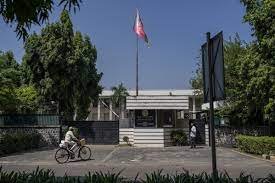The Afghanistan embassy in New Delhi announced on Friday that it will be closing permanently, due to “persistent challenges from the Indian government”. The decision, which takes effect on November 23, comes after the embassy’s previous plan to close on September 30, 2023.
India doesn’t recognize the Taliban Government that seized power in 2021, and the Ambassador and senior staff left for Europe and US to seek asylum.
Afghanistan Ambassador’s statement

Afghanistan’s ambassador to India, Farid Mamundzay, issued a statement that read, “The Embassy of the Islamic Republic of Afghanistan in New Delhi regrets to announce the permanent closure of its diplomatic mission in New Delhi, effective from 23 November 2023, owing to persistent challenges from the Indian government.”
“Unfortunately, despite an eight-week wait, the objectives of visa extension for diplomats and a shift in the Indian government’s conduct were not realized,” the statement continued. “The decision follows the embassy’s earlier cessation of operations on September 30, a move made in the hope that the Indian government stance will favorably change to let the mission operate normally.”
The Embassy of the Islamic Republic of Afghanistan announces permanent closure in New Delhi. pic.twitter.com/RNrR7NxrdP
— Press Trust of India (@PTI_News) November 24, 2023
The 22-year history of the Afghan Republic’s diplomatic presence in India has come to an end as all of its diplomats have departed, leaving the Indian government to decide the mission’s future.
As per the embassy it was under “constant pressure from both the Taliban & the Indian government to relinquish control, the embassy faced a difficult choice”.
The statement further added, “We acknowledge the limitations & concerns that govern the realm of realpolitik and the balancing act required at a difficult time in a geopolitically sensitive region. India has been a steadfast strategic partner of the erstwhile Afghan Republic since 2001.”
Therefore, “We firmly believe that the decision to close the mission in India at this stage and to transfer the custodial authority of the mission to the host country is in the best interest of Afghanistan”, the statement issued by Mamundzay stated.
What the decision implored?
The Indian government was asked by the Afghanistan embassy to grant permission for the former Afghan republic’s flag to be hoisted on the premises.

“In this challenging time for Afghanistan, where millions suffer because of poverty and socio-economic and political exclusion,” the Indian government is asked to take certain proposals into consideration.
The initial demand was for the Indian government to seize the assets, vehicles, bank accounts, and money in the Afghan diplomatic mission’s bank account—a total of USD 500,000. Second, the tricolor flag of Afghanistan should still be flown by the government on the grounds of the embassy.
In addition, the statement stated that it would thirdly “ensure the safekeeping of the embassy’s property and assets with the understanding that they will be entrusted to a legitimate accountable government duly elected or chosen by the Afghan people in the future.”
The embassy stated that “this decision is a result of broader changes in policy and interests” and expressed “cognizance” that some may attempt to characterize this move as an internal battle involving diplomats who purportedly shifted allegiance to the Taliban.
Taliban’s Rule in Afghanistan
Founded in the early 1990s, the Taliban is a Sunni Islamist nationalist movement that is pro-Pashtun and controlled much of Afghanistan from 1996 until October 2001. The first core of the movement consisted of males studying Islam in Afghan and Pakistani madrasas, or religious schools; the word “Taliban” is Pashto for “students.” In the southern part of Afghanistan, the Taliban established themselves and increased their power.
Twenty years after being driven out of power by American forces, the Taliban retook control of Afghanistan in 2021. They have clamped down on women’s rights and ignored essential amenities under their oppressive rule.
Afghanistan’s economy has collapsed under Taliban leadership. Hundreds of thousands of jobs have been lost and malnutrition rates have skyrocketed. The majority of women are prohibited from working.

Numerous human rights breaches have been documented by the UN mission in Afghanistan. Intimidation of journalists and limitations on press freedom by the Taliban have resulted in the shutdown of over two hundred news organizations. Protesters and activists have been watched and forced disappeared as their government has violently clamped down on demonstrations.
Additionally, they reinstated their Ministry for the Propagation of Virtue and Prevention of Vice, which in the previous regime imposed restrictions on actions judged to be contrary to Islamic law.
Following their directive to judges in November 2022 to apply their version of sharia, the authorities carried out public floggings and executions once more.
According to Amnesty International, there has been a sharp rise in the number of women detained for breaking discriminatory laws, such as those mandating that they only appear in public with a male chaperone and that they cover their entire body. Additionally, the number of child marriages has gone up.











